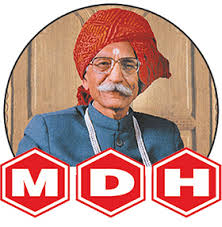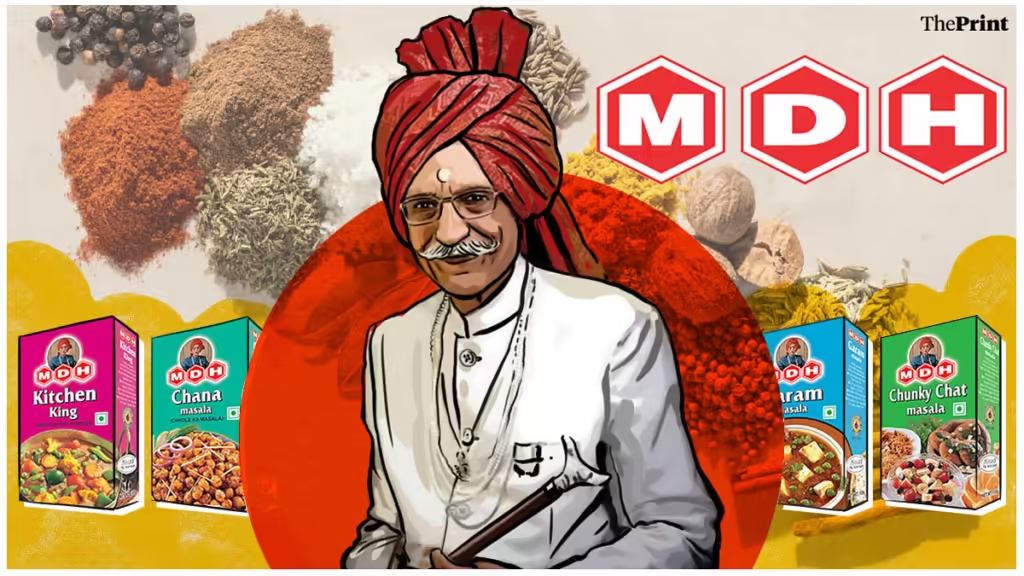
In the world of Indian cuisine, MDH Masala has carved out a unique space, becoming a household name synonymous with quality and authenticity. But behind this iconic brand lies an equally captivating story: the journey of Mahashay Dharampal Gulati, a man who rose from being a tanga (horse-cart) driver to one of India’s most celebrated billionaires. His entrepreneurial spirit, unwavering commitment to quality, and philanthropic endeavors have not only built a thriving business but have also left a lasting legacy.
This case study dissects the business strategy of MDH Masala, providing valuable lessons for business students, entrepreneurs, and executives alike. Whether you’re pursuing an MBA or working to build your own enterprise, the lessons from MDH’s growth, crisis management, and leadership are both insightful and actionable.
MDH Masala: A Brief Overview
Founded in 1919 by Mahashay Chunni Lal Gulati, MDH Masala was later handed over to his son Mahashay Dharampal Gulati. Over the decades, MDH transformed from a small, local spice business into one of India’s most recognized brands. It is currently one of the largest producers of spices, with over 60 products distributed both in India and internationally.
However, this journey was not without challenges, including crisis management in the face of scandals, brand competition, and scaling operations while maintaining the core values that set MDH apart.

Lessons for Business Leaders: Categorizing Key Takeaways
1. Brand Management: Building and Sustaining a Trusted Brand
- Personal Branding: Mahashay Dharampal Gulati became the face of MDH, featuring prominently in advertisements and becoming a symbol of trust for consumers. His involvement in promoting the brand was a masterclass in personal branding, which helped humanize the company and foster consumer loyalty.
- Consumer Trust: MDH built a reputation around quality and authenticity, consistently delivering products that consumers could trust. In today’s market, where brand authenticity is a key driver of consumer behavior, MDH serves as an excellent example of how to maintain long-term brand credibility.
2. Operations Management: Scaling While Maintaining Quality
- Strict Quality Control: As MDH scaled its operations to meet growing demand, it never compromised on product quality. From sourcing spices to processing and packaging, every stage of production was rigorously controlled. This highlights the importance of operational discipline in maintaining brand standards across different markets.
- Supply Chain Efficiency: MDH’s expansion was supported by a robust and efficient supply chain, ensuring that its products reached consumers without compromising on quality or freshness. A lesson here is the importance of streamlined logistics for scaling globally without losing the trust of your consumer base.
3. Crisis Management: Navigating Health-Related Scandals
- Handling Health Crises: MDH faced significant challenges when reports linked some of its products to potential health risks due to harmful pesticides. Countries like the Maldives and Singapore imposed bans on MDH products, prompting the company to take swift action. MDH’s response involved increased transparency and improved quality assurance, which helped the brand bounce back.
- Maintaining Reputation: Despite the bans, MDH’s transparent approach to addressing these concerns allowed the company to rebuild consumer confidence. The key takeaway for future leaders is the importance of proactive communication and quick response tactics during a crisis to safeguard reputation and trust.
4. Marketing Strategy: Local Appeal with Global Reach
- Cultural Relevance: MDH’s marketing strategy emphasized its Indian roots, appealing to the emotional connection that Indians have with food. Products like MDH Madras Curry Powder catered to regional tastes, ensuring that MDH was not just a spice brand, but a cultural symbol.
- Effective Advertising: Gulati’s decision to feature in advertisements as the face of MDH was a unique strategy that established a direct connection with consumers. His personality became intertwined with the brand’s identity, creating brand loyalty and setting MDH apart from its competitors.
5. Financial Management: Sustainable Growth
- Gradual Expansion: Unlike many companies that prioritize rapid expansion, MDH chose a more sustainable growth strategy. By carefully reinvesting profits into the business and focusing on long-term objectives, the company maintained financial stability while continuing to scale.
- Effective Cash Flow Management: MDH’s ability to manage cash flow efficiently enabled the company to weather economic challenges and continue to invest in its product line and distribution network. This is a lesson in balancing growth with financial prudence.

6. Corporate Social Responsibility: Beyond Business
- Philanthropy: Mahashay Dharampal Gulati’s legacy is not only defined by his success in business but also by his philanthropic efforts. He invested heavily in education and healthcare, creating schools and hospitals that benefited thousands of people. His actions underline the importance of giving back to society, reinforcing that corporate success is about more than profits.
- Social Impact: The significant social contributions made by MDH highlight how corporate philanthropy can enhance brand value and loyalty. Gulati’s philanthropic spirit not only earned him respect but also strengthened the emotional connection between the brand and its customers.

Conclusion: What Can Business Leaders Learn from MDH?
The story of MDH Masala and Mahashay Dharampal Gulati offers valuable lessons for entrepreneurs, business students, and corporate leaders across the globe. From brand management and crisis mitigation to ethical leadership and financial discipline, MDH’s success stems from a commitment to its values, its customers, and its community.
For those studying at top B-schools or already working in leadership roles, this case study underscores that success is a combination of strategic vision, operational excellence, and deep-rooted ethical practices. Mahashay Dharampal Gulati’s legacy reminds us that business is not just about growth; it’s about making a positive impact on society while staying true to your principles.
References:
- Industry reports on global brand management and crisis response strategies.
- Recent studies on the role of CSR in modern businesses.
Leave a Reply